In summer 2018, Mohanji visited Skanda Vale ashram in the UK. On 17th August, he did Prana Pratishta to the first idol of Lord Dattatreya in Europe (download discourse – mp3 ) and to Nagaraja murti as well.(download discourse – mp3 ).
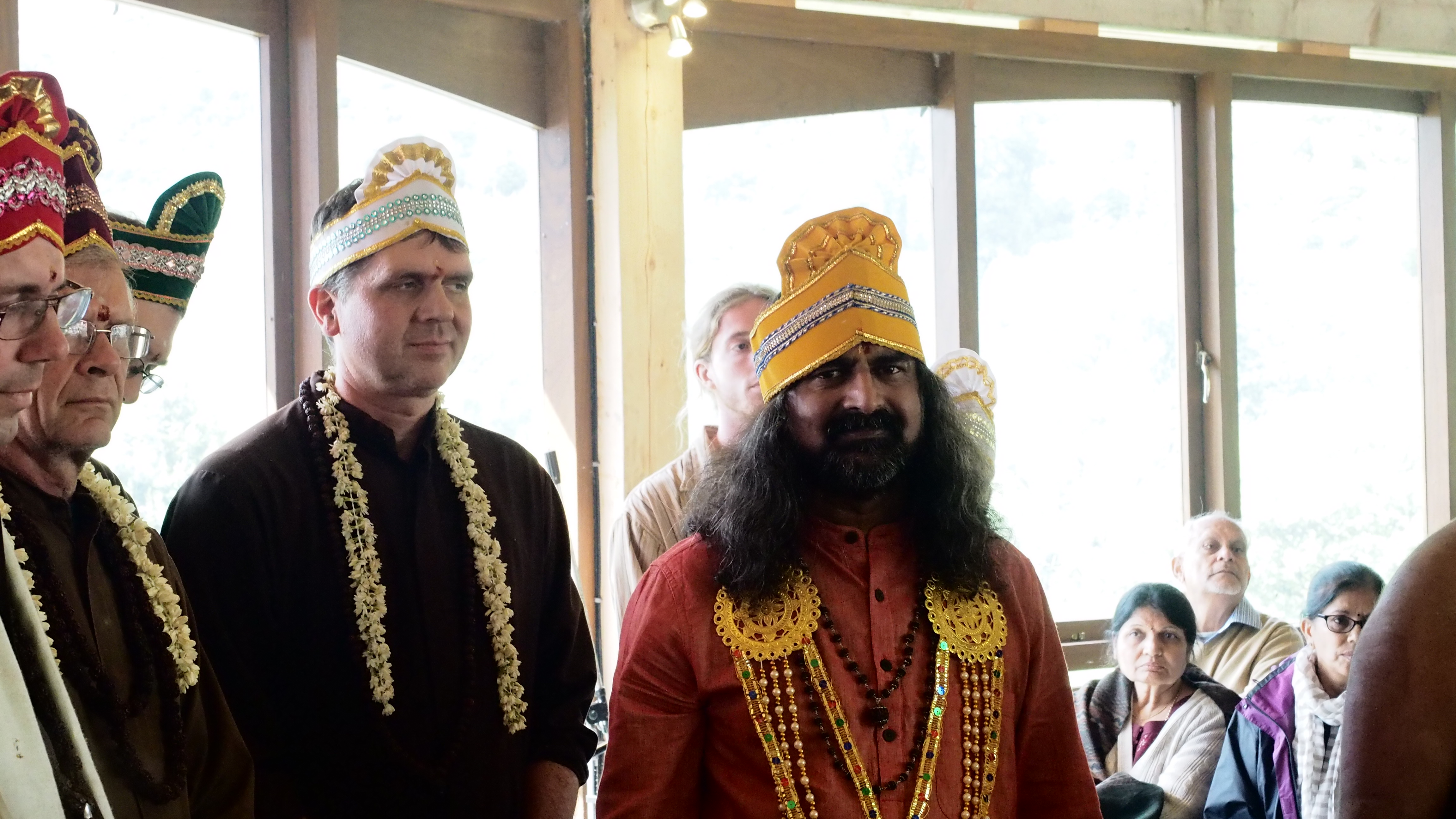
Mohanji: The two aspects which the scriptures talk about are Purusha and Prakriti, rough translation is Shiva and Shakti. Purusha is Shiva. His expression is all over. And for him to express he needs Shakti, that is Prakriti. Maya is relative truth. Maya is truth, but it has a relative duration. And Karma’s expressionis Maya. Karma is also relative. Everything is changing. Like when you are 5 years old, when you are 10 years old, 15, 20, … your understanding or your experience changes. Same material would have given you different experiences. Maya works in that way. It’s always relative. Absolute Truth is Matha or Mother; absolute truth. Shakti is the activity aspect of Shiva, and Shiva by nature is full and complete. They say that whole created universe is just like a pimple on Shiva’s space. Shiva is much larger than the pimple (Laughter). So Shakti is needed for Shiva, that’s Prakriti; it is Shakti. Prakriti is the creation, created out of pure consciousness which is Shiva.
I asked the question to somebody recently why Shiva got angry when Shakti/Sathi died? Shiva should not get angry, right? Will Pure consciousness get angry? Pure consciousness cannot accept that Shakti does not exist. That means there’s no creation. The Tandava, the expression, happened in a violent mode, because Shakti was dissolving into Shiva. When Shakti dissolves into Shiva, what happens? Pure Consciousness, no creation. So, Shiva shook up and he fragmented the whole thing again. With a lot of difficulty at one time he created the atom. Now again, that atom dissolving back to pure consciousness, then no creation. So, he expressed himself. It’s not anger; it’s like intensity. Sometime intensity will be considered as anger.
Speaker: Mohanji, I wanted to ask why we’re all separate, why we feel we are separate from God. The idea is that you come to know God, that’s the purpose of life. Why God is one and total and undone, why separate?
Mohanji: That’s only in the mind. See, when you’re in deep sleep, you have no separation, you’re fully in bliss, because you don’t know your time, your space your properties. But when you wake up, you have this mind factor or the mind matter; when I say mind matter, it contains mind, ego, intellect, which keeps the form that reinforces your identifications and all those kinds of stuff. So, you have an opportunity here that you can go, always see beyond the usual and connect to the absolute truth; that option you always have. But what happens is that mind never allows it so easily. Mind is only a reflector. Mind has no flavours. What flavour it is given, that flavour it will reflect. Mind is maintained by thoughts, the thoughts are the pillars which maintain the mind. This mind is constantly reflecting mostly programmed stuff, programmed with a program you’re used to: habitual feelings, emotions, and patterns. That’s what mind reflects. And when mind keeps reflecting it, you completely get diluted from the truth. That you are the consciousness which the whole universe is connected to. And you are the whole universe. Aham Brahmasmi is missed, right?
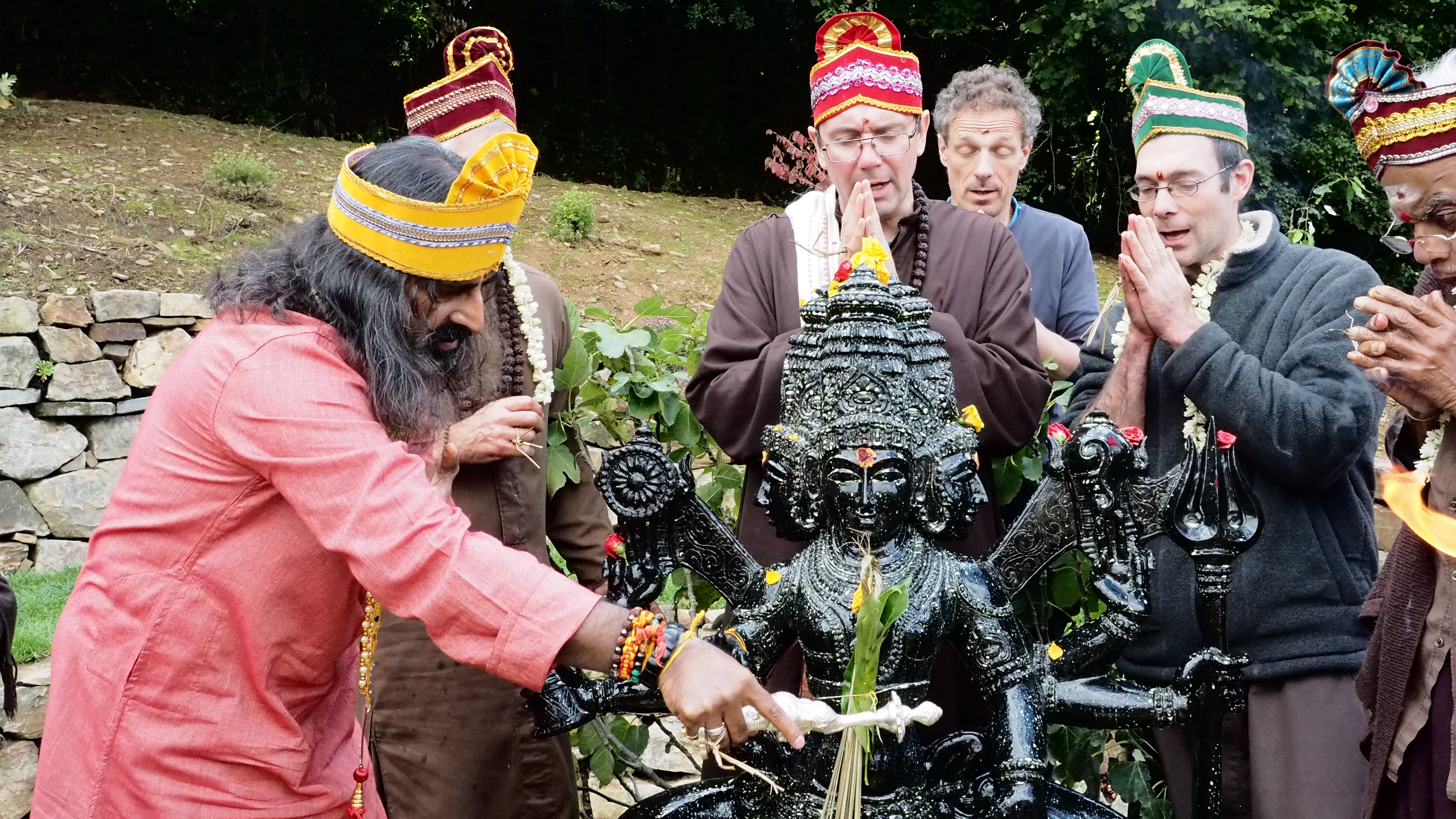
That’s why in the Upanishad, the child asks the father, ‘You keep telling I am divine, I don’t feel like I’m divine. Why you keep telling me that?’
The father said, ‘bring some fire’. So, the child brought a lamp lit.
Then father said, ‘I told you, bring some fire. Why have you brought a lamp?’.
The child then went and brought a charcoal with fire on it.
He said, ‘I told you to bring me fire, not charcoal’. To which the child replied, ‘Father, I can’t bring you fire without a medium’.
To which, the father said, “Divinity cannot express without a medium, and that’s what you are.”
So if that understanding is constant, then the Maya will dilute. Maya cannot exist. Because you will only see your reflections everywhere. When you’re when you’re seeing anger in people, understand the anger sits in you. What you are, you see its reflection in everything. Like if you are extremely sick and you are looking at a beautiful sunshine, you will feel nothing. Because you’re not well; it’s not connected to the sunshine. But because how we are gets reflected back to us, or we experience it that way. That’s the truth. This is how it always works.
Three stages every day are given for you to connect to these. One is the waking state. The second is dream state, where your dimensions are different. Your dreams are coming directly out of your subconscious. This data sits in your subconscious. And in the third deep sleep state, you have no idea who you are – death state. And then you wake up again. Birth state; rebirth in the morning. That’s why some people are lazy to get up. Because we are taking a new birth, it takes time to walk. Immediately you will not walk right; takes time. (Laughter) Don’t take me seriously. (Laughter).
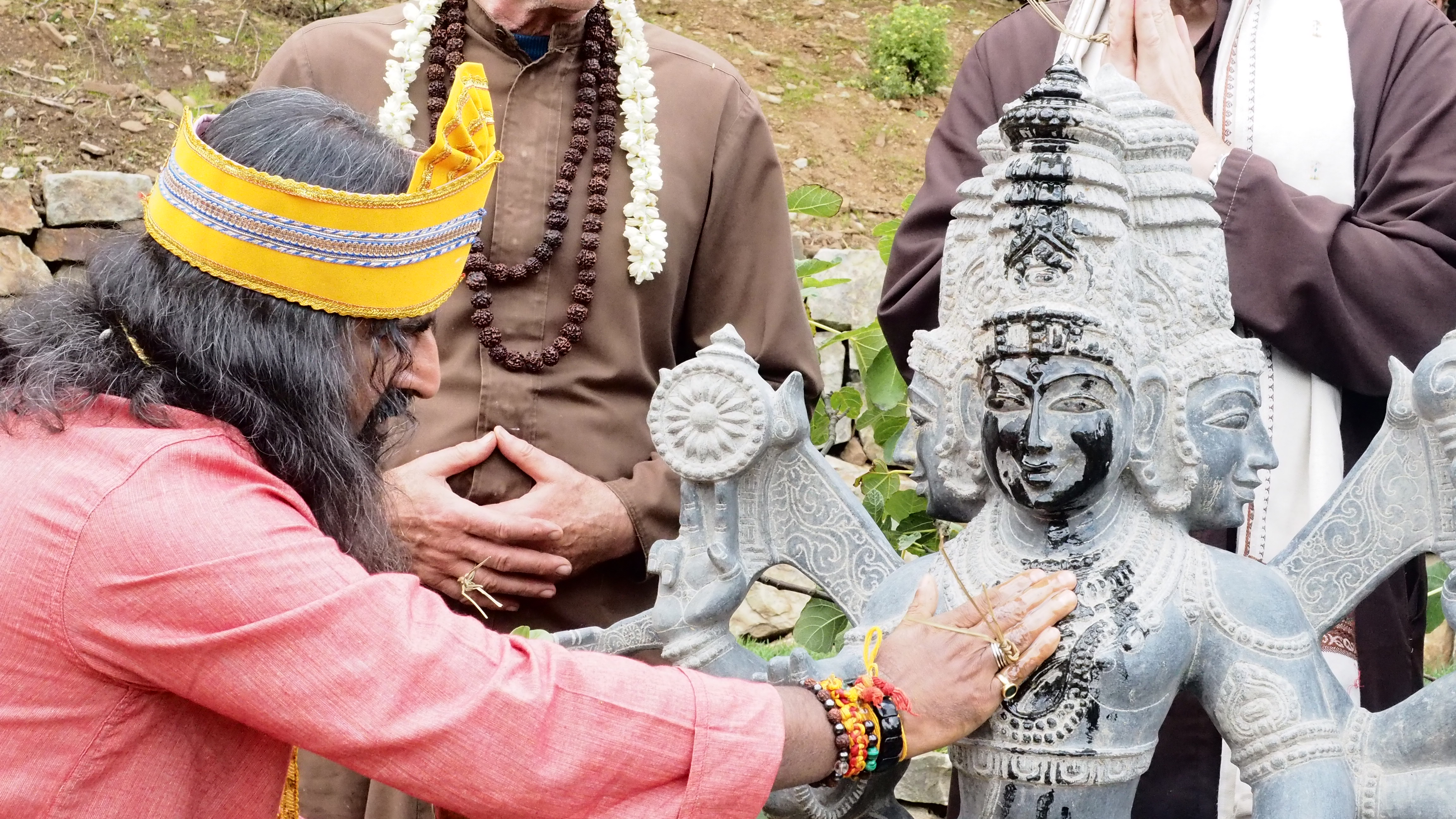
Speaker: Mohanji, can you talk about, I don’t quite understand yet clearly enough for myself, about the mind, the concept of the mind or the definition of the mind? Or why do we have the mind to create the problem? And in relation to the consciousness.
Mohanji: Mind is like an organ. Let’s look at it… ask the question again.
Speaker: I asked about the mind and to define it more in detail. Mind in relation to the consciousness.
Mohanji: You look at mind as an organ. And what is its purpose? Experience. Experience is the purpose. And mind with your eyes you see, mind with your ears you hear. Otherwise sound will be there but you may not hear. Many times, when people talk, you won’t hear, right? Because mind is not with the ears. Mind with your nose, makes you smell. Mind with your skin makes you feel, with your tongue it makes you taste. And like that… Mind’s job is to experience existence. And it is said that there are millions of things outside, this is all for you. This whole thing is your arena, your football ground. It’s all for you, but then how much can you experience it? Only as much as your capacity. Like for example, you have two eyes. What happens behind you, you cannot see. You can only experience where your eyes can reach. Like that we have limitations. So numerous things, to experience them you have five senses, one mind. Mind with that particular sense makes you experience that particular thing. And what is the experience, broadly classified? Happiness or sorrow. This is human existence.
Total human existence. Millions of things, five senses, one mind, happiness or sorrow. This is how we live. Now this much is okay. Because this is nice. But then, how does mind becomes a botheration. When mind goes into the past, keeps/stores thing of the past and goes into the future with expectations, anxieties, fears, then that’s where the problem is. Otherwise mind has no problem, or mind is not a problem. Minimal mind is always good. Because you have a cool life. You experience every day. And you don’t store anything. Nothing from the past, nor we are going to the future. But does it stay like that? That is when awareness should come in.
What’s the basic awareness? Past is dead, finished. You can do nothing whatever you want to do in the past is impossible. Clear awareness. Future is yet to be. If you mess up today, your future will be messed up. So, we do what is best in this time. And if you stay in that time, that’s what I was talking about these activities here. Guru Subramanian kept it in such a way that it’s a rapid, very fast repetitive mode so that your mind can’t move. You know, you keep the discipline, you stay here, that’s a technique. So when you’re focused on your activity totally, hundred percent here, mind stays here. Then it doesn’t have time to move to the past or the future. And in that point, in that mode, mind is very effective. Mind is your servant. You know you’re here. Future… it doesn’t matter. The past is done. So in that mode, mind is effective.

But when you’re leaving the mind to roam in the past and the future, and regrets and relationships and problems and all those things, then it controls you then mind becomes the master. That is where the problem is. Otherwise, there’s no problem. If mind is your servant, there is no problem; for which the key, or the rope, or the leash is awareness. Awareness that I am only existing now and I have no idea about tomorrow. We don’t know whether we’d be alive tomorrow. And also, it doesn’t matter. No problem. Let it be. So, that’s the way to be. Is it clear?
Speaker: Yes, the question is as well why we keep a mind and why do we need to have a mind…
Mohanji: That’s what I told you.
Speaker: …then the link to the consciousness which is the state of the mind.
Mohanji: Consciousness is not the state of the mind. Consciousness is a factor which remains the same through waking state, dream state, deep sleep state. That is what we call three states, three cities, Tripura. And then we have fourth state. Like for example, you have all the sensors eyes, ears, nose, all those things. Behind that there’s a mind which is experiencing the world through these things, right? Senses cannot function by themselves, they’re part of your body. Right? Mind uses these senses to experience the world outside. Then mind processes it as happiness, sorrow. Two things. This is good for me, this is not good for me.
Now what is consciousness doing? Witnessing this function of the mind while energizing it. So, consciousness is the minor transformer, which is giving the electricity to the mind to experience life. And consciousness has three states but is the same. But in the waking state mind is more than consciousness or you wouldn’t know the consciousness sits. In dream state, mind and consciousness are more or less equal. In the deep sleep state, there’s no mind. Only consciousness. So, in the three states, consciousness is the same consciousness, but you experience it in three states. Right?
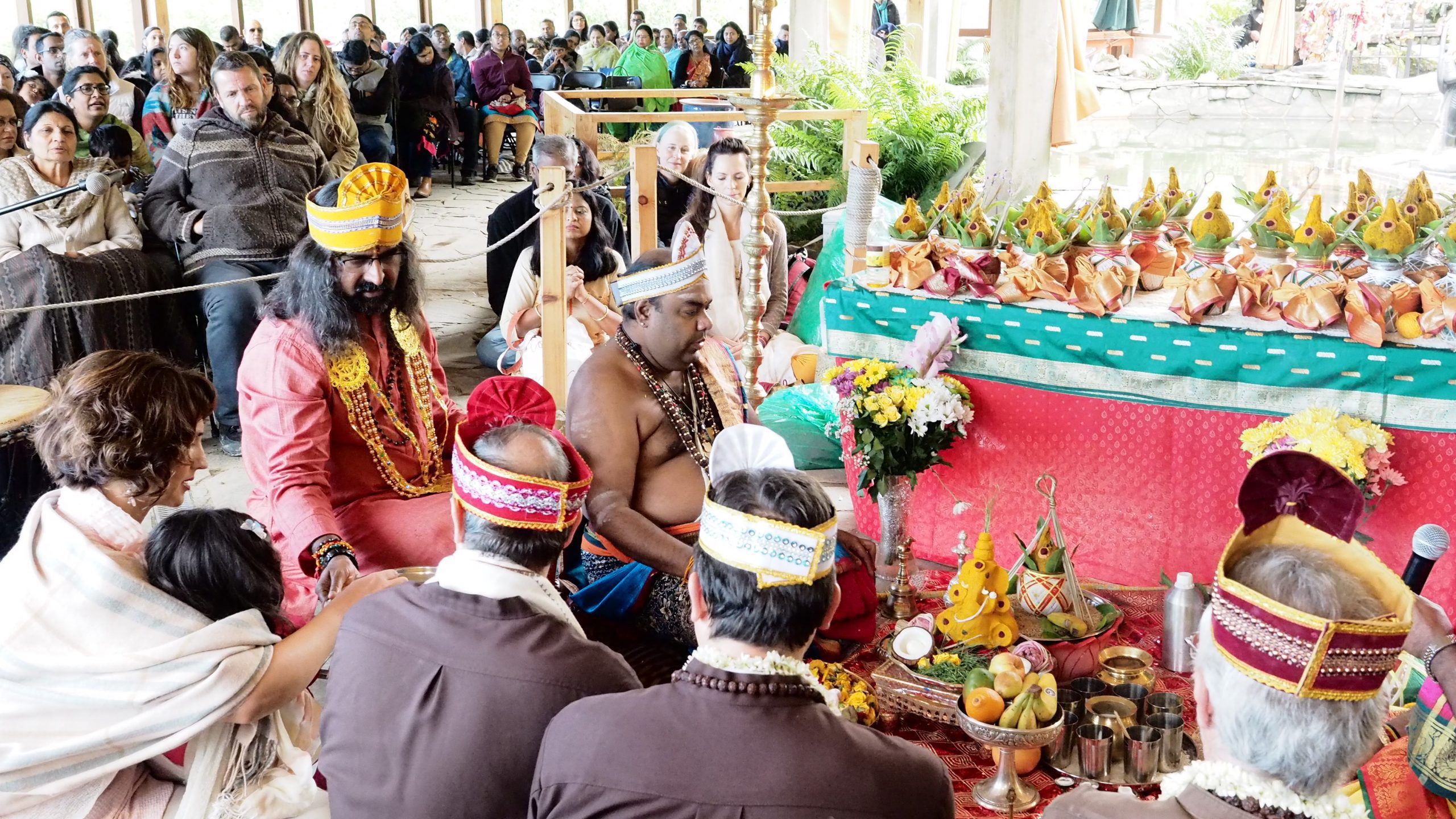
And there’s a fourth state called Turiya state where that state experiences the three states of consciousness as a detached form. Then there is a Turiyatita state beyond that; that is the soul state where the soul witnesses the consciousness witnessing the consciousness in three states and the mind beyond. Very simple. (Laughter)
Q: I was just wanting you to explain something about a Subramaniam aspect of God which we are worshipping here at Skandavale at the moment, specifically for people who might be new to Skandavale and not understand quite what’s going on when they’re looking at this.
Mohanji: Ah, Swami should tell you that. (Laughter). I should not talk about that. I don’t have the licence to tell everything.
(Group laughter)
Mohanji: I will just brief on this.
Subramanya
Shiva has two sons. Shiva probably has other sons but two that we know. Ganesha, represents a supreme consciousness aspect. That is why he has a huge body, elephant head, etc. because rithambara budhi, the intellect, cosmic consciousness is represented by the head of the elephant. That’s the highest or the largest mammal represented. And the huge body represents the created universe. Shiva is supreme consciousness represented by Shivalinga. There’s no way you can worship supreme consciousness which is un-manifested, beyond dimensions. So, the best form the great Rishis thought of is a Shivalinga. That is why you look at all the atomic reservoirs of the world, it’s in the form of Shivalinga, that form can source or store maximum energy without distortion, without a leak, without losing it.
Shivalinga is representing Shiva, a supreme consciousness, formless, and Lord Ganesha as the supreme consciousness, the larger aspect of Shiva. And Lord Muruga is the knowledge aspect. The pure knowledge; not the knowledge like… it is now morning and evening, and stuff like that. Knowledge which is the truth; that is why Subrarmania explained the secret of Omkara to father Shiva. When Shiva had a doubt as to what Omkara is, Subramania (skanda) explained this to Shiva. Why? Because Shiva is Omkara, he doesn’t know what it is. So, Subramania told him this is what you are. That means he’s knowledge incarnate. And also, there is an aspect of warrior. That commander aspect is because, we now talked about all these four people, four thieves. There are many things Kama, Krodha, Lobha, Moha, Mada, Matsarya, etc. All these are enemies of progress. He is fighting against them. Means he is knowledge incarnate. To keep knowledge, you need to ward off ignorance. Kama is what, uncontrolled desires; krodha, anger; matha, pride; matsarya, competition spirit; lobha is lust that you need more and all that. Moha is desire – I want this, I want that; never satisfied. All these things are against knowledge. So, he is the commander, who is protecting you from these enemies. So that you are with pure knowledge. Pure knowledge is the state of Shiva. And Shiva himself as Dakshinamoorthy is another aspect of this knowledge. Dakshinamoorthy is Shiva who is looking south. Where you can see a lot of Rishis around him. And Muruga has been worshipped mostly by the Siddhas; he’s connected to Siddhas. 18 Siddhas and all those people are connected to Muruga.

Q: So, what I hear from you is that… when we go inside we have in a way or an answer we have, you know, there you are. But they do seem to be meditations, or this kind of best parts seem to come clear to you as you live this life. So, what I have in mind is to be witness with people when they die. And, actually, it was funny when you were saying with the boat, and crossing, because it’s as if there’s a moment when you come over in the boat from the other side, I never actually go to that other side, but you are somehow a ferryman. And then you, you move into this other place when you, this is what you do. And it feels that as the years have gone on, and then I mean, well just watching, we move here. And there is no hospice right here. Although I don’t actually have an issue with that part of it, but—
Mohanji: You should.
Q (continued): …that as the years have gone on the whole working or being with people as they leave and the people around that has become more and more, a very real meditation and expression in the world we live in now.
Mohanji: You are in the right track. Yeah…
Yes. Every moment is meditation. If you are aware that is it. That is, “Life is meditation”; not sitting in one corner and thinking you are meditating. And the shift of stages at the time of death, is amazing. Because basically it is nothing. Just leaving the body. No big deal. But then the process, where it is connected to attachment, to this body, attachment to things around us, all these things, everything, becomes completely irrelevant. And then you are leaving. That’s exactly what we are talking in the last part. How much you can raise your awareness at this last part, that becomes the flavour of existence of next life. So when you transcend, you move in that zone. That’s why suicide, murder, and all these things are absolutely detrimental. Because the last part of your life, you are on a level of resistance, then the next life starts with resistance. So, we must always be in a level of ecstasy.
You know, if you can leave with a wow, beautiful.
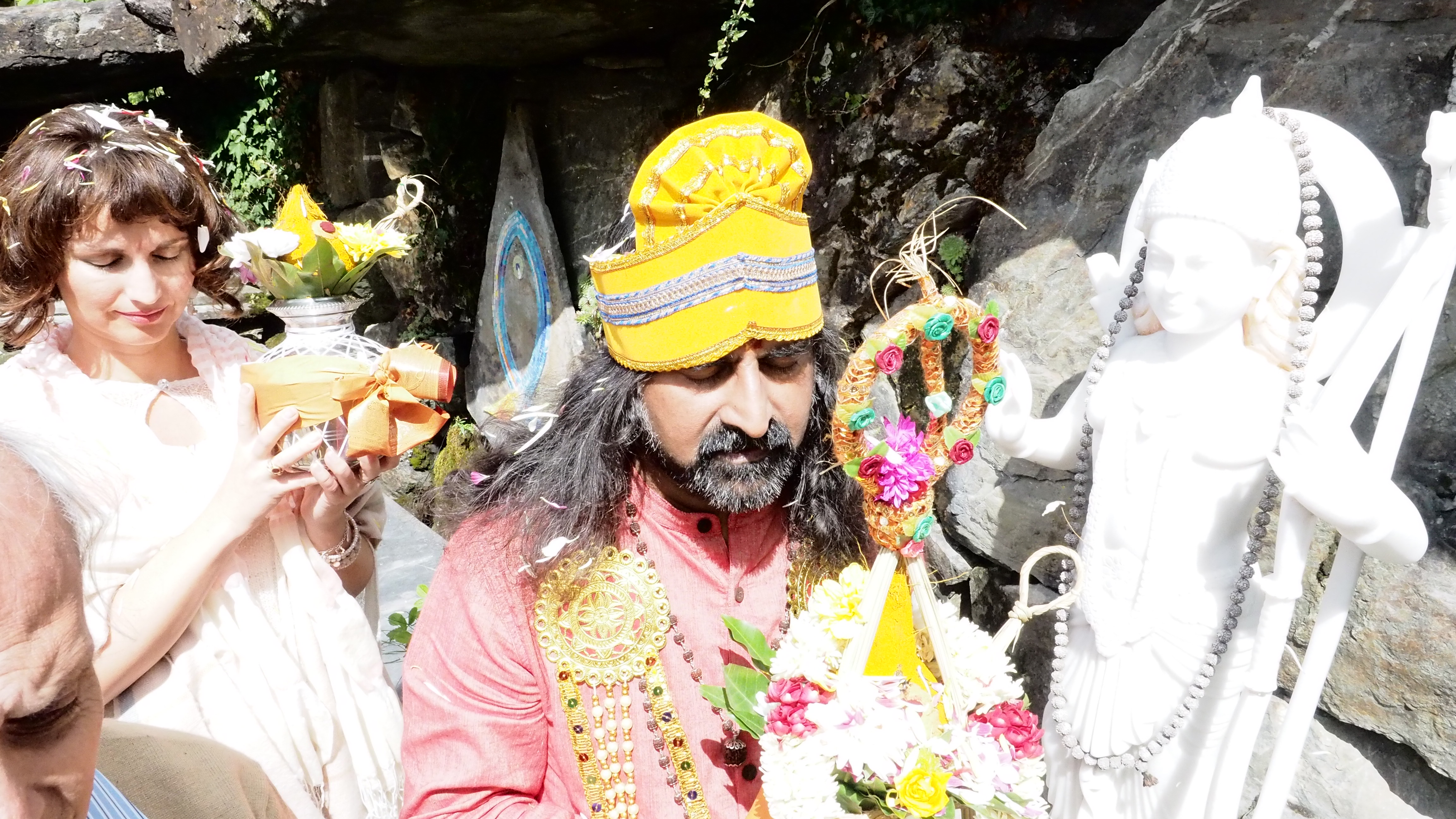
Speaker continues: And this is what’s happening more and more. It’s a way that I lived many years in India. And of course, in India years ago, in the 70s, if there was a dead body, then you actually didn’t go near it, and you didn’t touch it. And sometimes that could be very shocking. But even India also is changing in the way that…I guess that last moment, for even, for people that maybe haven’t so much meditated, can be a leap. And I don’t know, this just seems like…
Mohanji: That’s why, I don’t know about now much. But earlier, it was they light only one lamp in the place. So that the person who’s leaving connect to only one flame and there’s no distortion. When you’re connected to a flame, and the flame is going up, and then you’re connected to brightness. Plus, the chanting will be a scripture or something like Sahasranama, so that in that vibration provided through chanting, they leave.
A story about calling the name of the Lord
There is a story of one guy who was very selfish in life. And he hated Gods; he was an atheist. And he hated his children also because they were squandering his money. Then he named them the name of Gods, because then he can remember them more. Because those whom you hate you remember more, right? (Laughter).
One day he was lying down to die, and the lord of death came. It was a very fearsome point, because all that he earned all his life is going. Going to whose hands? To those he hates, his children. So, he wanted to scare his children, he called Narayana, Narayana. His son’s name was Narayana. He called Narayana to witness the lord of death, because he was scared. And when he called Narayana, Narayana, the lord of death left, because he called the deity. So, he survived. Then he was wondering, “How did I survive?” Because he called the name of the Lord at the time of death; Lord Vishnu.
These kinds of stories are there, that say the right names should be uttered at the time of death. But that has to be cultivated over time. You have to practise it. Otherwise, it won’t come at that time. Only think about electricity bill, water bill, credit card, cheques you have signed, and so on. That’s not good enough. You are thinking of practice, right?

Q: Leading on from that question prompted me to ask another question. The couple of deaths that we’ve experienced here in hospice, or here in Skandavale. It’s been either when what I perceive to be the soul leaving, or after a person has died. The vibration is beautiful. The two of them. Absolutely.
Mohanji: Stillness…
Q (continued): And yeah, and love and beautiful, and especially, you know, special, like you’ve walked into a temple, but you’ve walked into a room with a dead body. But that person is not long left. Actually, somehow you can feel that, that if they’re still there. And I was wondering, what is that feeling? Is that the soul leaving?
Mohanji: Normally, they only leave the body after 13 days. They hang on with other sheaths: the body sheath is the food sheath, then pranic sheath, the pranic layer; then it’s mind sheath, knowledge sheath, bliss sheath, and then the soul. Soul is in the middle and all other sheaths are around it. And that stays except the body, physical body. And they hang on for approximately 13 days.
Speaker: In the same place?
Mohanji: No not necessarily. That’s why in some of the places they keep food for them after they die. Everybody eats, they can also see but they can’t eat and they don’t have the body but everything else.
Speaker: When one of our sister’s was dying, and I know a few people experienced it, it was as if she hadn’t died. But it felt, I don’t know if this was that the soul was leaving the body, but it was dancing. It was so joyful. It was bliss.
Mohanji: Yeah, when your connection to, or when your ownership levels are less, the moment of leaving the body is beautiful. Because you feel such a relief.
Speaker: That’s what it felt like as well. I’d like to say maybe she didn’t die.
Mohanji: In fact, you know, most of us experience this during the deep sleep state. We get out of the body peacefully and then we enter, some people have that remembrances. People have written about it, that they had an ecstatic state, the same state and there’s a quick rewinding of the major events of life and then it’s stillness, and then it’s peaceful. Shanthi. Perpetual.
Speaker: That bliss is…?
Mohanji: That’s your state. If you have another incarnation to make, then you go ahead with your work. But that transition, it can be beautiful but that’s where you need to connect to something larger, bigger.
Speaker: …and many people have done that in their life time?
Mohanji: Yeah, yeah. For example, connecting to one object like Lord Krishna or Muruga or one deity all the time, chanting, then that consciousness automatically raises to that level, and it will be an ecstasy to go. And otherwise, connecting to a very powerful master, same thing. Whichever frequency you connect to, that helps you to go out and that energy stays in that same way.
Q: But what about people who haven’t had any connection or seemingly any connection to spirituality?
Mohanji: No, but, it’s not just one life, right? It’s a continuation. What they have done in past to reach here, that person doesn’t know. In this life what they have done, probably they will know. And most of the activities may be unconscious; they don’t know what they are doing. But what brought them to this frequency, they may not know. It’s a continuation. Each life is like a page. You shift the page, another life, then it becomes the full book.
Speaker: And you said you do a quick rewind.
Mohanji: That’s each life.
Q: That’s only for that life, you won’t see the other life?
Mohanji: No, because you don’t see those lives now. You don’t see your past life now. That’s rewounded, then you go to astral plane, then you rework that, and you say okay, this is what you wanted to experience and this is what you have to experience, pending desires, then you take an incarnation. That’s why I said the USB is removed from the laptop, and USB contains your pending desires and your memories collectively. So that includes your connection, relationship, character, etc. Sometimes character also evolves over time. Character, desires, memories – these come together and then the sheaths (koshas) carry these and go, and then the USB is put into the next body and restarted. Then you bring back all this.
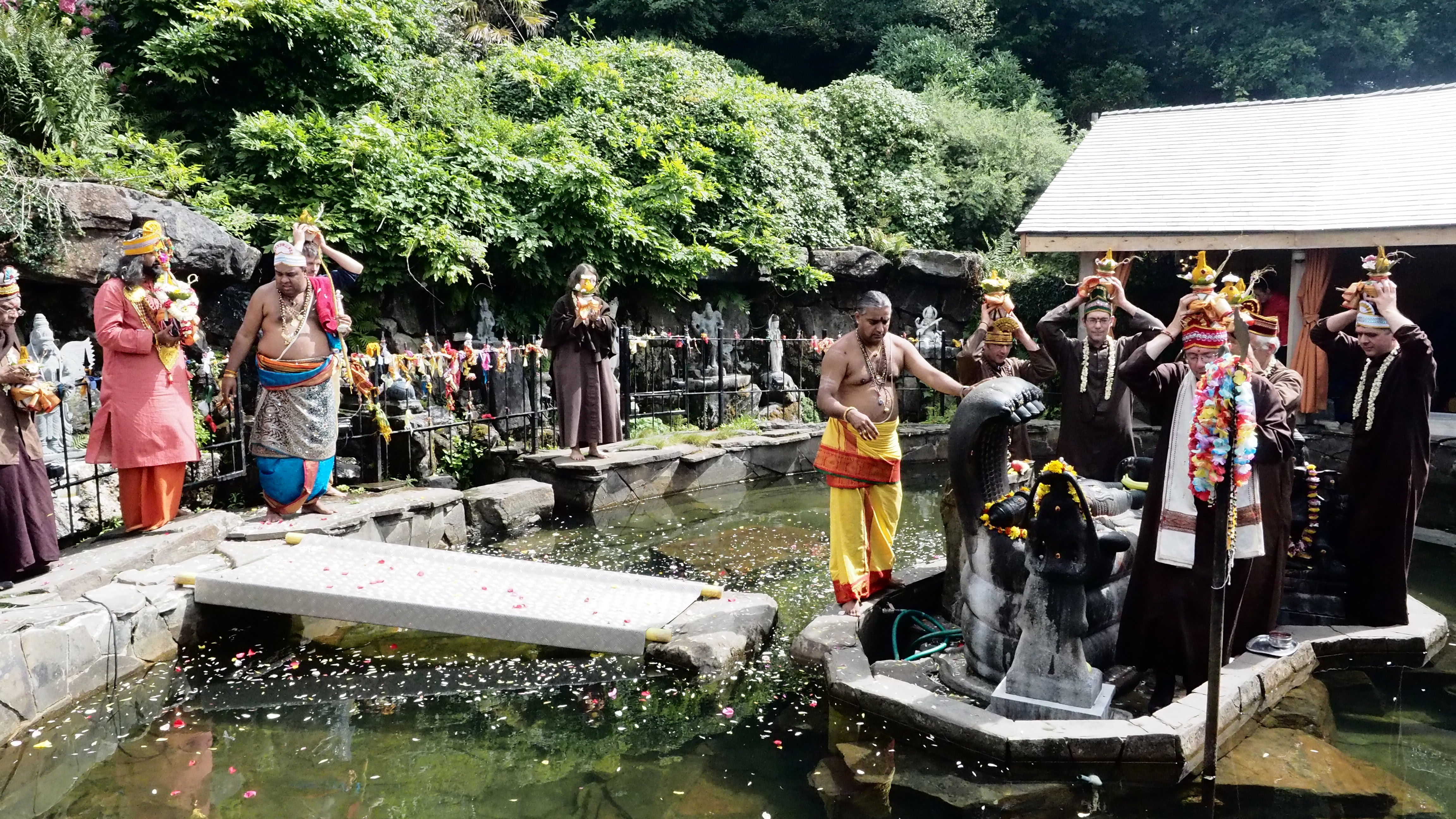
But again, as I said, between a death and a birth there is a shift happening as well. That each page is not that you’re just starting in that frequency but at the evolution, with your awareness, the awareness can evolve and then it comes back to another body differently. So, what you miss most in this life becomes the predominant agenda in the next life. That’s why don’t miss much in this life. Because that becomes a pending desire, agenda, thing to do. When you sum up or you configure your existence of the next life, that will come up as a top thing to do. Like we have our daily agenda: this I must complete today, this can be done later. Like that, and thus, the whole lifetimes are defined. That’s why, masters like Shirdi Baba say you have come to me. Now let me reduce your number of lifetimes. You know, imagine this is to be laid out over 50 lifetimes, let’s make it 20. That way you reduce the total. That’s what great masters do. They shrink it. So that your merger becomes faster. That’s why it’s the interest of every master that you liberate yourself as fast as possible. And in the interest of soul is to liberate as well, as fast as possible. And even the information, the pattern, the roadmap, that comes only with the right eligibility, otherwise, you won’t get that. You won’t even think that. I mean, many people don’t even think beyond the mind or the gratifications, they don’t even think of a beyond state. Forget about death state. Death is a fear for many people. Death means big problem. One of the greatest fears is the fear of death. I’ve seen that even in spiritually high people. Towards the end they become very jittery. ‘Oh, I may die’. Very good. (Laughter).
But I’ve seen that and sometimes it surprises me. What’s the big deal? However, that remnant of fear sometimes exists without knowing. Not that you store it, but somehow the fear of death comes. It could be also collected, it could be acquired, maybe it is not yours. It can be that you have seen so many people’s trauma of dying, and you may get that impulse into your system, and then you think it’s yours. You wouldn’t remember that it is not original and you forget. For example, there’s some dirt on your body and you forgot to take a bath or wash it away, it stays, right? Like that, you collected from the nature and that has stayed on and then it stays. And at the time of death you have that fear.
Q: In your book Power of Purity you said playing video games especially violent ones and watching violent films or any films, reading newspapers your subconscious takes that on, and doesn’t differentiate between whether you’ve actually committed the act or whether…
Mohanji: Yes. Whatever your conscious mind dwells or subconscious think it’s real.
Speaker: And so, then you said karmically you have to live that out?
Mohanji: Not necessarily. That becomes your flavour, or part of your system. Whatever you consume, enters your system. Similarly, all inputs have effect in the system. Subconscious mind doesn’t know whether you’re actually doing it. When the conscious mind is working on it, subconscious believes that this is real, so it just stores it.
Speaker: So if you’re kind of killing people in a video game, your subconscious thinks…
Mohanji: …thinks it’s actually happening. That’s why I was talking about soap opera. The victimization of people, very bad people, and people only thinking bad, how to harm other people. When you constantly dwell in that kind of energy, subconscious believes this is what you like. So it creates a life for this, to have this kind of things – emotions, etc.
Speaker: So, it’s not something you have to live out…
Mohanji: Not necessarily, you can go beyond it. If you raise your awareness beyond it all, this becomes insignificant. Yeah, but will you stay there? Because mind likes gravitation quite a lot. Mind likes to come to the lower frequency, we call it gratification. So if we stay beyond it all, it’s very good.
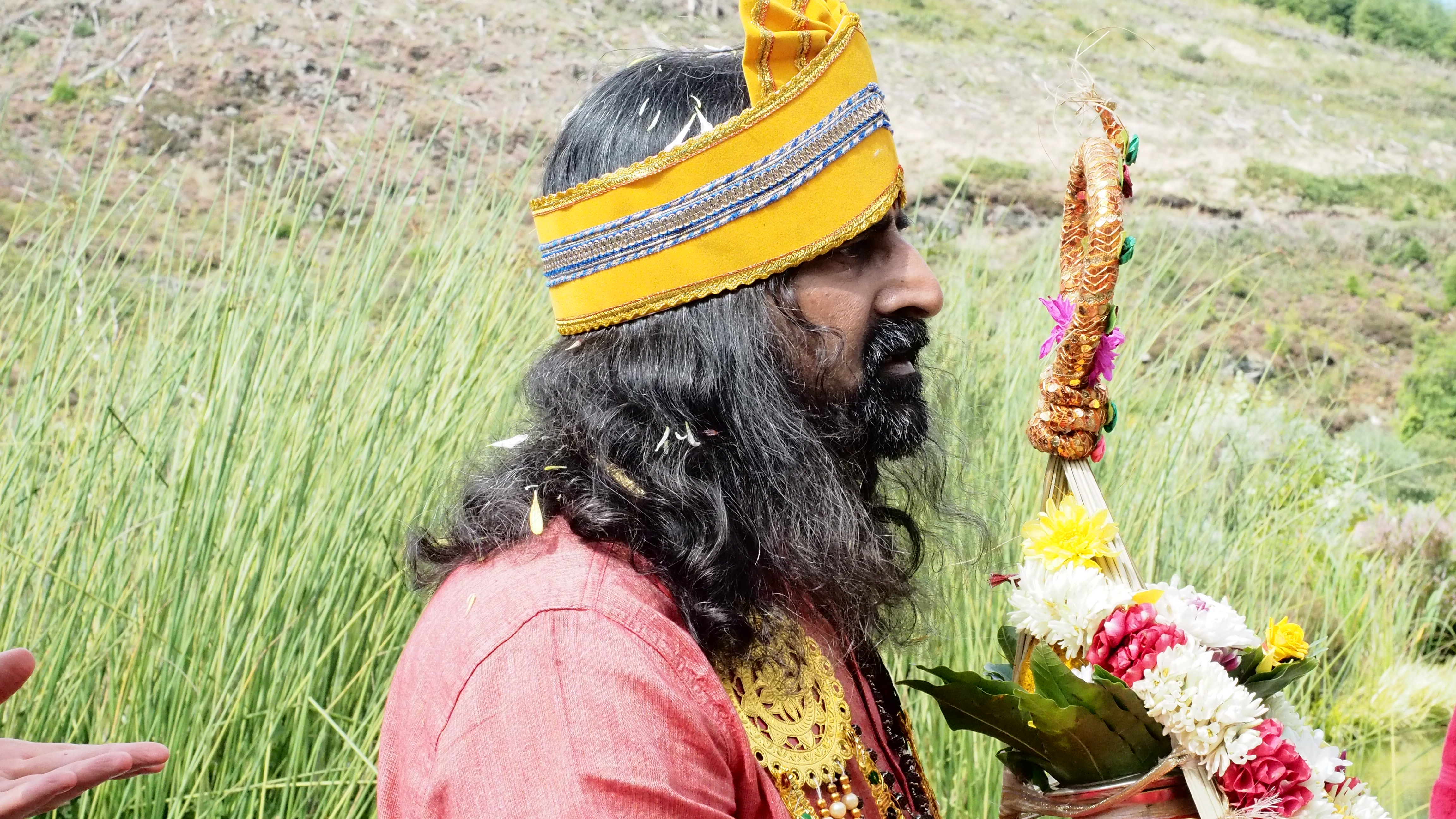
Q: I just wondering how do we increase will power so that we can become a bit more master over ourselves?
Mohanji: Laughter J. Iccha shakti, will power – center of heart. Jnana shakti – third eye. Kriya shakti – navel. Three shaktis: Iccha shakti, Jnana shakti and Kriya shakti. Three aspects of Shakti. It’s center of heart. If you concentrate on that and chant and…
The main thing which is against the Iccha shakti is tamas, inertia, like laziness, “Okay, I will do it later,” like that. That has to be countered by positive action; action as well as chanting on heart center. Close your heart and chant whatever, any chanting inside the heart centre. This is the place for the Kriya Shakti, action. Sometimes people become lazy. ‘I must go for jogging; okay, tomorrow! Then the day after…’ and then we pay somebody to jog for us.
(Laughter)
There’s a video of one guy who’s got a treadmill; he’s sitting on a chair with a beer and doing it… it’s the height of laziness. Very bad Kriya shakti.
(Laughter)
But understand one thing. It’s never constant. It can never be constant in human existence. It’s always waves. Vivekananda says this, “Life is all waves. Sometimes high, sometimes low. Our ability to accept these highs and lows is very important.” Watch your own life, it can never be constant, right? “I’m inspired all the time” – never happens. It’s not possible because we have a lot of factors connecting to it. So, it has to be high; it has to be low. Our ability to flow through like a wave rider, that is how we become successful. Not that you’re always on low and always on high; it is guaranteed not possible. Maybe when we are sitting and meditating in a cave in Himalayas… still there will be highs and lows. “Today I don’t want to meditate. I am catching mosquitoes”.
(Laughter). Anything is possible.
We must accept realities as it is. When it is high, understand “I do maximum.” When it is low, “Okay, now this is low, nothing is working, slow down.” It’s like the road is bumpy. But you really want to drive in 120 km/h, is it possible or not? Not possible. You have to drive as per the road. But later the road becomes good, the nice open road, then drive. That flexibility or adaptability is more important than the highs and lows. Recognizing highs and lows is good, “Now I’m very productive,” do your best. “Now I’m not productive,” then “Okay, I slow down, I work on it.” But keep walking. I mean, don’t just sit there, you slowly move. Even 1 km/h speed is also a speed, right?
Speaker: Sometimes you feel like, “Oh yeah, I’m on a good road, doing things well, and then sometimes, it’s like mmehh…oh, why…”
Mohanji: That’s how it is. 7.5 billion people will tell you this is how it is. This is how the whole creation has this thing. Because we are playing duality. This is the drama, we are playing the duality, there’s an up and there’s a down. if there’s no up or down, there’s no duality. So in this duality, there is dark and bright, up and down, high and low. It’s all part of duality. And that flexibility and adaptability makes us successful. Never judge ourselves, then you will not judge other people. Right? And do not criticize yourself. Because we tend to compare with other people and we say we are not good enough. What happens is, even if you have an opportunity for full actualization, because your opinion about you is not so good, you will deny it. This is the problem. Then you take a lifetime to correct. Do you understand what I’m saying?
When you when you judge yourself or criticize yourself, you deny an experience also, without your knowledge. Imagine you have a potential for a really great experience in this life, but you say, “Oh, I’m not Mohanji, I can’t do this or something like that.” And then even if you can achieve it, you will deny it. At the end of the day, who loses? You will lose.
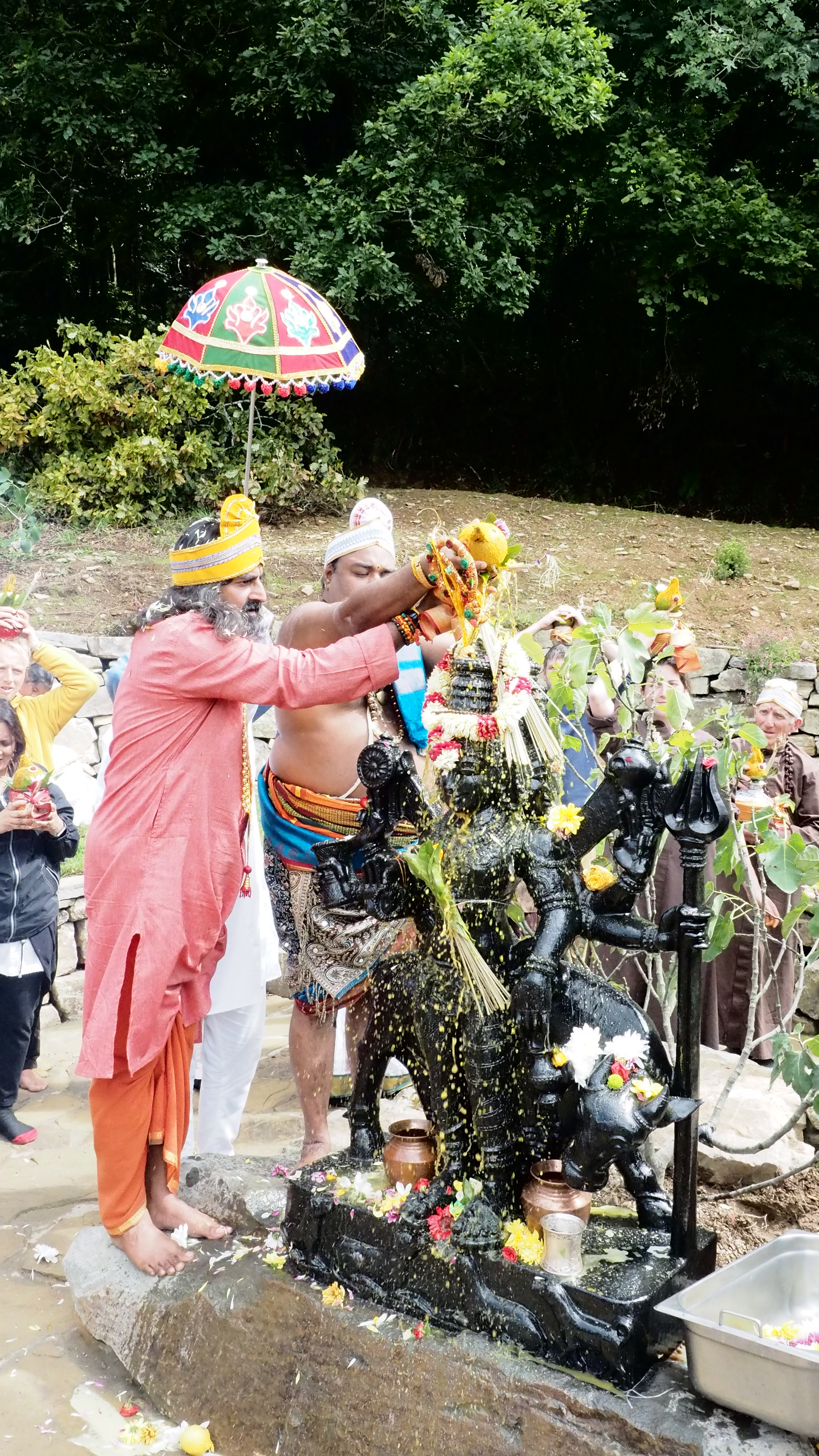
That is why Lord Ram went 14 years in the forest. He was in Avatar, he could have just shot an arrow from Ayodhya all the way to Sri Lanka, killed Ravana and brought his… he would have probably even prevented Sita from being kidnapped. An Avatar! But he went through the whole process. He took the help of the monkey squad and everybody, everything because he had to demonstrate how an ordinary man should handle life. That’s why. He did not present himself as an Avatar. He presented himself as an ordinary man for the sake of us. Otherwise, there’ll be no Ramayana, maybe only two lights or something.
(Laughter)
Or… He came to kill the demon, so he sat and shot an arrow. Finished.
(Laughter)
Whole chapters are not needed.
Furthermore, have you ever observed why Hanumanji is so powerful, and there’s so much worship, there are so many temples of Hanuman. So many temples. He is worshipped much more than Ram, there are more Hanuman temples. That is because Hanuman’s only object of worship was Ram. Totally integrated into Ram. And these Ashta siddhis (the 8 siddhis) and Nava nidhis (9 nidhis), again all the types of wealth were originally Ram’s. When you’re deeply integrated into a consciousness, which is very powerful, you have all those powers. Hanuman was deeply connected to Ram, unmistakably connected, all the time thinking about Ram, only Ram. And then what happened, he had all the powers of Ram. The supreme consciousness, Ram is supreme consciousness. So he was constantly integrated into Ram, and he had all the powers. Another way of diffusing the ups and downs, stay connected, deeply integrated, and you experience the supreme consciousness all the time and then you will not judge because “I don’t exist, only he exists”, right? Hanumanji was not an ordinary man, he was a very, very powerful master. He was a great master. He said, “I prefer to be your servant in this existence, I prefer to serve you. Your wish is my command.” Then he said, “My body is always at your feet, to serve you. And let me be like this.” Then third thing he said, “But consciousness wise, you and I are one. Let’s play the role.” Pure awareness, right? Perfect awareness. I am not separate from you, but I prefer to play this role. So I’m outside of you, I can serve you. So it’s easier for me to integrate. Perfect bhakti yoga (bhakti-devotion).
It’s all for demonstrating the aspects of existence. That clearly states that these are possibilities. When you clearly know these possibilities, there’s no way you can be deviated. And as I said earlier, what you should choose is what suits you. What you can practise without effort, that suits you. What you practise with effort is not yours. Understand, you will drop it someday. You will want to wear a dress which fits your body. If it is three times larger or three times shorter, it’s difficult, somehow even if you fit in, you will not like it. Yes, please.
Q: Just one last question. What is actually the purpose of life?
Mohanji: Experiences, what you’re experiencing every moment. That’s it. it’s a moment to moment experience. Purpose of life for everybody is that even if it is a bird or an animal, that moment is the purpose and we have no idea about the next moments. Each moment’s experience is our purpose.
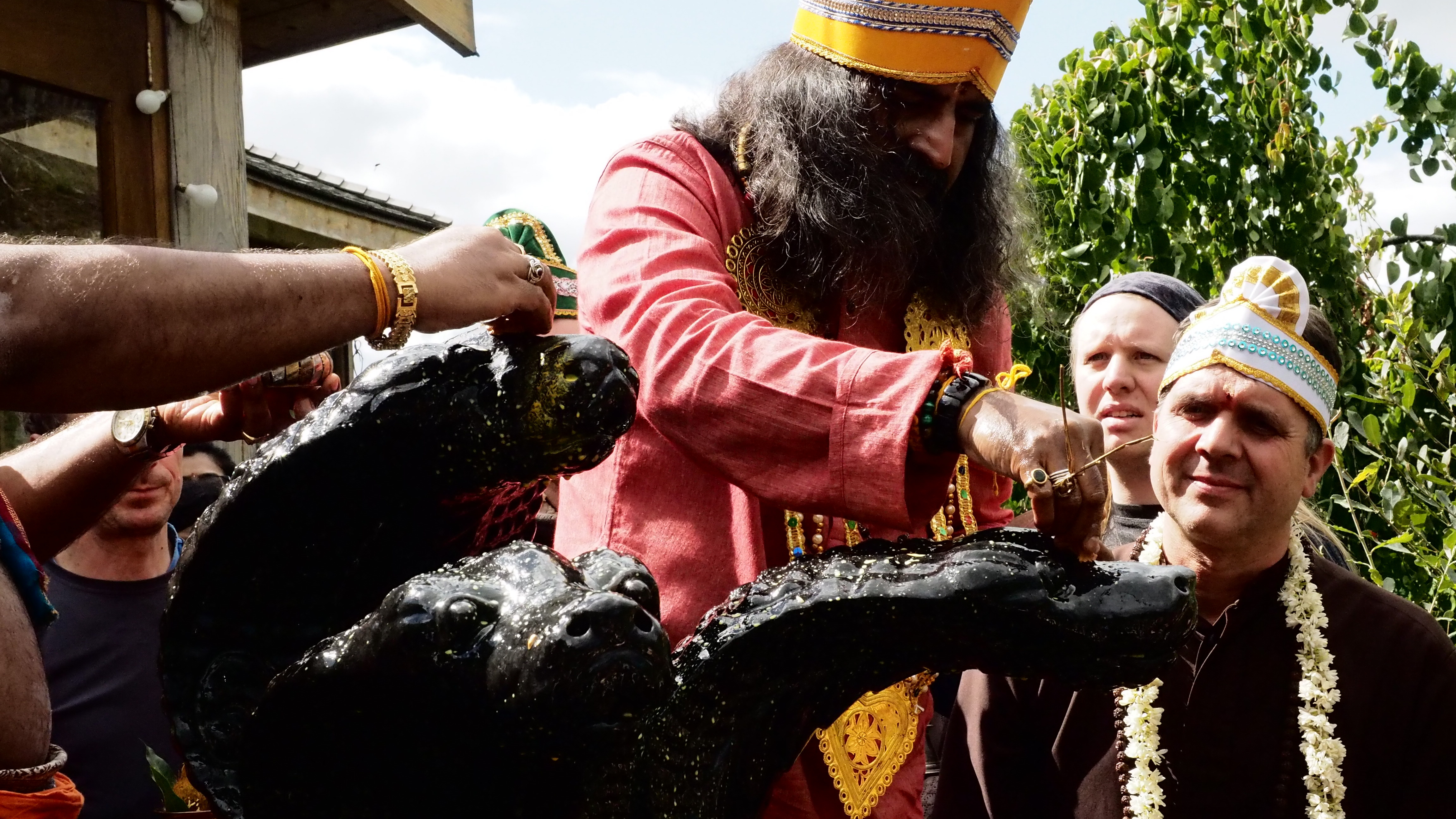
Q: Why is some of the experiences bad or good?
Mohanji: It does not matter, they are all experiences. That discrimination happens only in the waking state of mind. Mind tells this is good, this is bad. And that’s sometimes or mostly connected to expectations. I expect to be successful every time. But if success doesn’t happen the way I want I reject it. Then we say some, “It’s a bad experience,” things like that. So it’s all connected to the mind. Experiences are experiences. We decided and always, there’s no guarantee that an experience which we term bad is always bad.
A story – Bad is not always bad
There was a king who caught one of his favourite ministers and chopped his finger saying that he had been stealing. The minister was very sad because he hadn’t been stealing. Later on he was caught by tantric people who chop the head, bali, as human sacrifice. They wanted somebody and they caught him, but he had no finger, so they let him go. Because they said, “You are not perfect, your finger is missing.” Then he understood that the finger lost is better than the head lost.
(Group laughter)
So we do not know, sometimes some of the experiences which we call bad, are not always bad, we need to read the full story to understand.
Q: In common with a lot of people, I’m sure. Sometimes you get to a certain point, and you become very aware of a long period of time, some pattern of activities has been governing your life, certain habits, some mentality, your aspirations remain out there, not where they should be. And I was wondering if you could shed some light on how to break down pattern other than diet, (laughter) presumably one way of doing without going to that extreme. You’re trying to turn everything upside down or bring yourself out of that in a dramatic way.
Mohanji: I’ll tell you the nativity of it.
How does a repetitive thing come in life? Not even an activity?
There are patterns in relationships, patterns in money situations, patterns in jobs, we experience so many patterns in normal life. Where do they come from? They come from deep impressions.
For example, imagine that you have been travelling a path of pathless, like an aghori. One thing happens today, a totally different thing happens tomorrow, there is nothing settling. Everything is flowing, flowing in the sense, there is no system.
Then what would be your greatest interest?
To have a system. That would be your priority or top priority, “I must have a system functioning, there is a predictability.” When we dwell too much into unpredictable paths, we will crave for predictability. And then if it didn’t happen in that life, next life will have predictability pattern as a main theme. So, the path will be all predictable. But then predictability also brings monotony. Because you can predict every moment. So it brings monotony, when it brings monotony, you say, “This is crazy, I can’t have monotony, how do we come out of this?”
Thus in this war between unpredictability, an unpredictable path, like the path of Shiva, path of pathless, path of Datta, the way you travel, that’s the path and Avadhoota state, state of Avadhoota, where rain or sun, good or bad, it’s all the same to a state where there is some kind of a pattern. So when that is travel, mind will crave for a pattern. When a pattern happens, we have monotony connected to it, it’s always connected to the mind which expects.
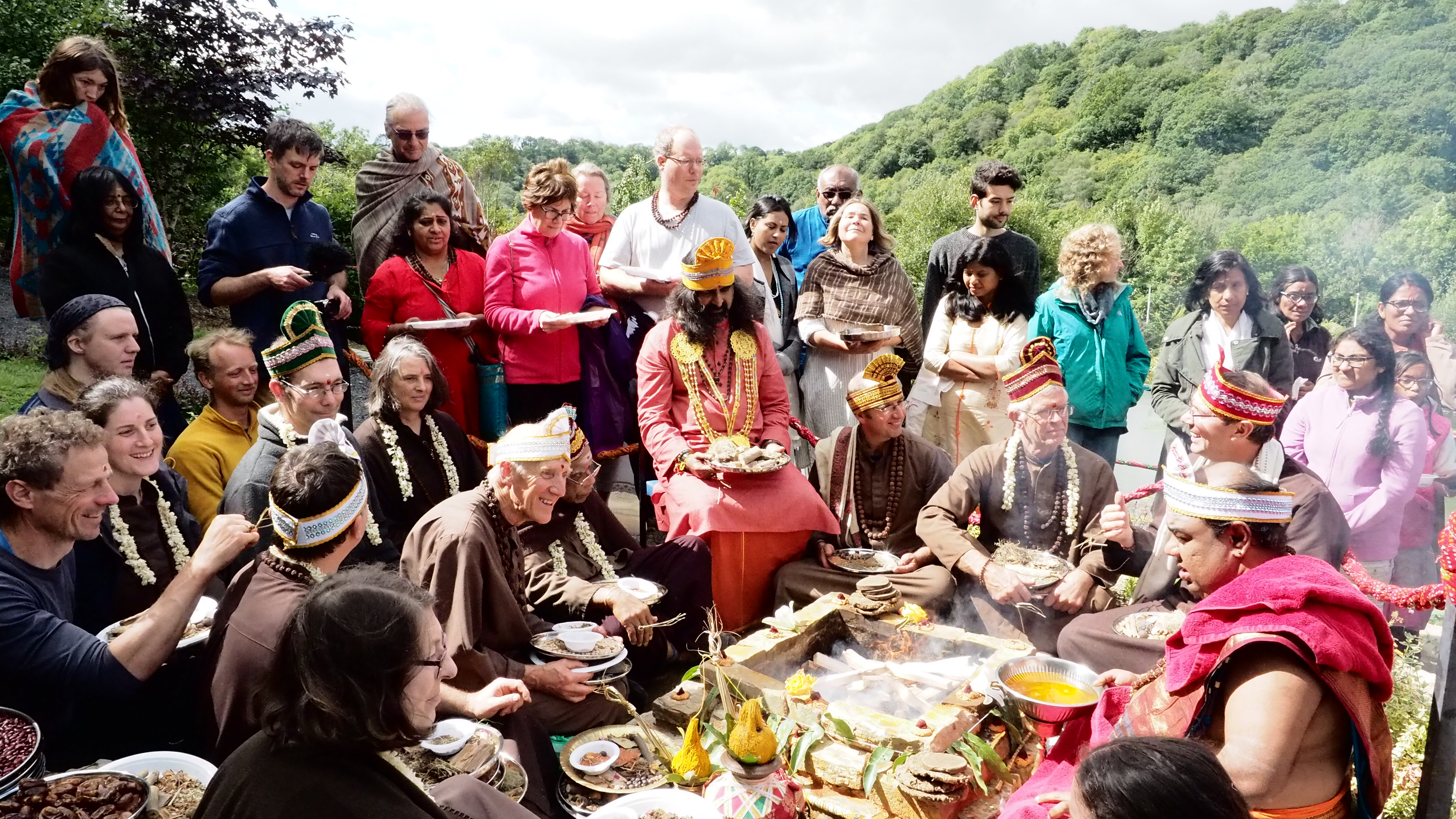
What is the best way to overcome that mind?
Awareness. Awareness beyond it. Beyond this activity, there is a growth and growth is in awareness. There are so many things probably you never wanted or they were fringes, they were not really sufficient to integrate into a life. If it was sufficient to integrate into your life, it would have happened before taking birth. So, if it is not integrated into life, in this pattern, this was not so important in the original planning. Then, if a pattern is happening, this pattern is actually what is chosen. When you resist the pattern, it stays. When you say, “Okay, this is the pattern happening, no problem.”
A story of a Buddhist monk
There was a Buddhist monk who was giving lectures, and a lot of people respected him. One day, one girl became pregnant in this village. And she said this monk was the father. Everybody came, bet him up. Tore his house to pieces, etc, and brought the woman and gave it to him saying, “You must look after this woman because you made her pregnant.” He didn’t say anything. And then the child was delivered, he was looking after the child and he never said anything, yes or no or anything. After eight years or nine years, this girl started feeling very guilty. She saw his love and kindness and he was looking after them as ever, I mean, as perfectly as possible.
And then she told the village, “You know, actually this guy is not the father. The father of the child ran away. And I did not want to tell this to you to people because I was ashamed that I would be ostracized, that I would be expelled. That’s why I told his name.”
Then they came to the monk to apologize, “We are very sorry that we did not understand.”
“No, it’s okay. No problem,” he answered.
Then, there was no nothing from him. His awareness was above every activity below. Nothing touched him and he was just floating and he was in a state of bliss and all these activities was happening. No expectation of only glory, no expectation of only scandal or slander, no expectation. So what happens is your awareness is above everything and these patterns die by themselves. Because patterns lose their importance as well. If there is an activity, “Okay, I’ll do this activity,” from moment to moment. Moreover, other things do not enter either. Because there’s no “This is not good, then another thing should…” So the replacing doesn’t happen. Replacement sometimes means and the life. If you can’t replace something in this life, it automatically means another life. That means you’re ensuring another rebirth. That also will not happen. Because your awareness is above. And this routine is giving you more and more and more stability and you are dissolved.
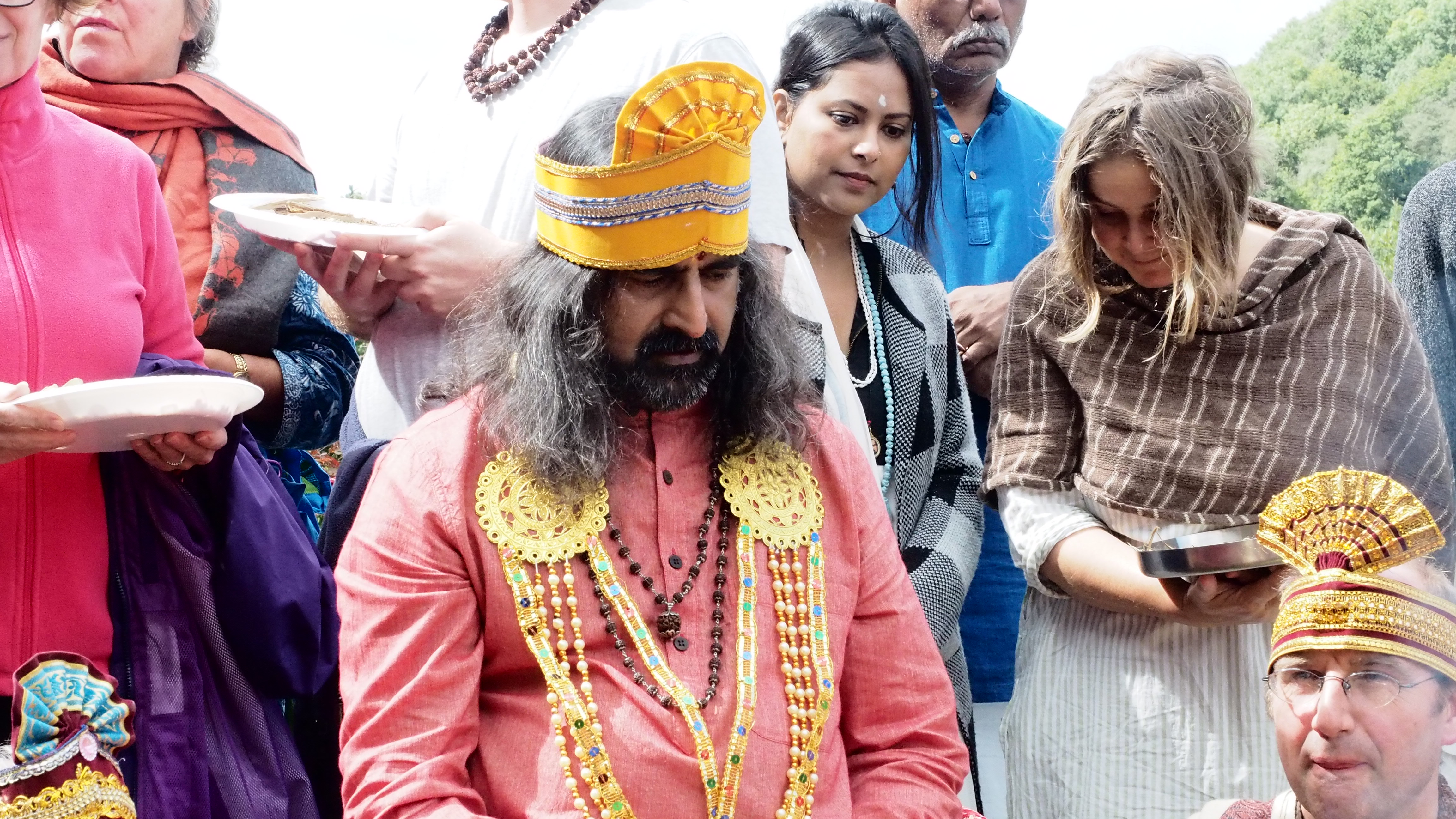
That’s the way to overcome every situation, whether it is a monastic order or actual life. When you see from above, all the things happening, like we said, there are no good or bad, everything is happening and you’re watching it and it’s all happening, it’s flowing. And you’re not binding to it. You’re not even taking ownership. Like this girl said this guy was the father, he didn’t know. And people thought it was true, because he didn’t say that. Nor did he care. Later on when the girl said this was not the father, again he did not say anything. Why? For 8 years you looked after the child and the mother and you did not say anything? He kept quiet. Then they understood that he was a powerful Master. So it sometimes takes time.
Why I said this story is because we have every chance to keep our awareness here (he puts his hand high up). It doesn’t have to be here (he lowers his hand down). When it is here (at that low level), we always have opinions. We maintain the patterns. Because we resist. Maintenance is equal to resistance. We have objection, like human relationship. I don’t like this person, so I keep resisting, that person is always with me. It happened, right?
(Laughter)
We get married like that.
(Laughter)
Not my marriage…
(Laughter)
I put my hand in fire.
(More laughter)
That that’s the way it is. So it’s all about awareness. One word, awareness. Acceptance and awareness are two things which are absolutely fundamental for high speed growth and evolution. Acceptance is to yourself. It doesn’t matter whether you accept other people or the world. Because if you don’t accept yourself, you can’t accept the world. World is your reflection. So every bit of acceptance is to yourself as a full incarnation. Then awareness, awareness, that everything happens will also pass, nothing is yours. Even the body, everything comes and goes. Then this other resistance and other things will automatically vanish. In this life. This is the flow so be it.
Speaker: Does worship of God, let’s say in the form of Dattatreya or doesn’t matter which god, is that the key part of achieving that awareness?
Mohanji: Yes, worship is equal..
Speaker: That is our way of life. That is that process which is happening.
Mohanji: Yeah, worship is integration. Worship means you’re connecting to an idol. Idol is never an idol as it is, it’s an ideal. You know, an idol represents an ideal. Ideal is a state. The state of a master is represented by the form of a master. That is why I said, Mohanji is not the body, Mohanji is a state which is connecting to people. When you’re connecting to the ideal, then you are surrendering to that ideal. Why do we worship different deities? People have different tastes, and why because that ideal suits us. It’s suitable for us, for us to connect and integrate. Like in various places, there are different plug points, different types, so every plug will not accept every socket. You have to sometimes use converters. Here, I’m talking about no converters. The right plug and the right socket.
So you integrate to Bhagwan Ranganatha, or Bhagwan Dattatreya and the integration is equal to surrender. That’s what Hanumanji story I said, I don’t exist, he exists. I exist as his servant, means basically, I have no existence. I don’t need existence. A true disciple is almost like the shadow of the guru. When the guru moves the shadow moves. This is how it works. True, true disciple. There are hardly true disciples today, because people even judge the guru, “The guru should not look like this. He should…” They have opinions. Then all these opinions and doubts segregate. It is opposite of integration. That’s why it takes time. Then when you disintegrate, or you are separate from the truth or the master, you have all the effects. Everything hits you directly, all the pleasures, all the pains, all the phobias, concepts, doubts, everything hits you. Here if you are integrated to the guru, the shield is always there. Nothing hits you. So when you worship Ranganatha, you are Ranganatha. Always remember, there’s no separation. When you’re worshiping Ranganatha, you’re worshiping yourself. When you’re worshiping Datta, you are Datta and that idol is your representation. In that mode integration is just, like a matter of time, a very fast process. It happens very rapidly.

Mohanji: Yes, please. Yeah.
Speaker: Namaste.
Mohanji: Namaste.
Q: Since we’re talking about this mind and matter, I’ve got one question, suppose the attachment of ones in other’s minds, can that mind be degraded, on upgraded?
Mohanji: If the attachment is from the other person to you, rather than you from other person…
Q (continued): Well, suppose he’s got a high level of mind, he’s attached to some kind of devotion, or he is on the super value, and the attachment of that person to other person can degrade him or upgrade him?
Mohanji: Neither. Neither in fact.
Speaker: The reason I’m saying is that say that attachment of the mother to the son, or the attachment of the devotee to another devotee or to the lord or the master can move him from one place to another place or it will be in the same place?
Mohanji: See, fundamentally, attachment is connected to relative truth, it’s not permanent. We have seen people very deeply connected, and then later bitter enemies, or bitter enemies coming together. So everything is in a relative basis. We cannot say that this stays forever, another one stays forever, we cannot say. In addition, we can’t determine high or low, because somebody who’s deeply connected to the Supreme consciousness, whatever other people think, it will hit them, but it will not be enough to bring them down.
Somebody who’s very deeply connected like a Buddha, for example, who had one focus. He wanted to attain liberation. And his focus was that – he left his family, he did everything to attain that. Many people told him, “You made a big mistake, you should not have done that…” Even after enlightenment he was told that. But nothing moved, because what he wanted with the life with the original agenda, we talked about the prarabhda, part of the karma, which brought forth this existence, the original karma is powerful enough to take you through. In between all the other, the people, the relative experiences, the people coming in life, people going, their opinions, their likes and dislikes, they are all having only complimenting or contradicting whatever it is, as a flavour. Like your ice cream is one, you add strawberry and it becomes strawberry, add chocolate, it becomes chocolate like that. It’s a flow, life is one flow. In the flow of life, all these are relative experiences, nothing is permanent.
Speaker: Yeah, but as you say that in so in in the past, and we have we have seen so many places where the God has to come down to Earth to fulfil the wish of a devotee. In that sense, if you’re saying that is not true…
Mohanji: No, no, that is completely different, right?
Speaker: That is attachment as well.
Mohanji: No, that is a different thing. Devotion matures into oneness. See, when this attachment is what you asked earlier, through emotions between people etc. when you are deeply connected…
Speaker: Sorry, when I said, I said what one’s mind here, if you put one mind to another mind, can that mind be degraded or upgraded.
Mohanji: It depends actually. The state of mind itself is temporary. And the mind we are talking about is only operation during waking state, only when you are awake. In dream state it is not the same mind. In deep sleep, it’s not the same mind. So we’re talking about the waking state mind connection. Is that right or wrong?
Speaker: So if you keep on thinking of the same, the mind is always on the same thing all the time.
Mohanji: Yeah. When are you thinking?
Speaker: In deep sleep you are thinking the same thing, if you are awake you are still thinking the same thing.
Mohanji: How do you know that you’re thinking in deep sleep?
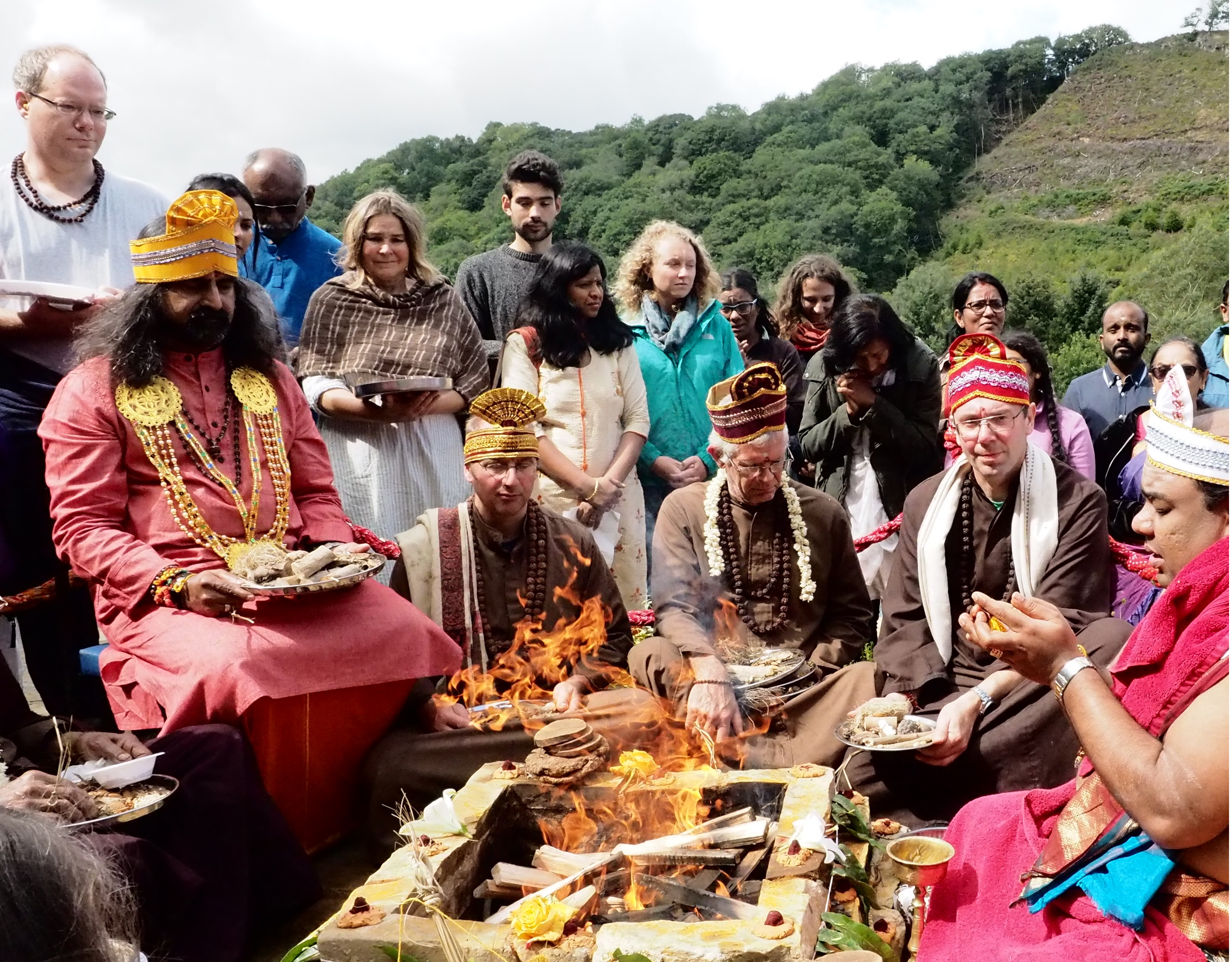
Speaker: Because you can’t sleep because of that…
Mohanji: Then you are not in deep sleep. It is not deep sleep, it is sleeplessness. Then that’s a waking state.
Speaker: It is not waking state I am talking about.
Mohanji: No, no, no, I’m countering you. No, you want to argue with me?
Speaker: I do not argue with you.
Mohanji: No, no, no, no, in this intellectual thing, I don’t normally engage. Because this is very simple. You’re talking about waking state mind, temporary, dwelling on relative stuff. Correct? Whether I connect with your mind, or you connect with my mind, it is two minds connecting. How long? How long will it connect? It has a duration, right? And this duration is already defined in that life. Some people stay connected longer, some people do not connect longer. Now we have three states. In dream state, you definitely cannot connect to that person. You say you are not sleeping because of another person. For example, you fell in love, all the time thinking about the lover. You don’t sleep, because sleep is not important. Thinking is important. That is not a dream state or a deep sleep state. That’s a waking state, extended waking state. Correct? In that mode, in that intensity, there is an influence between two people, for sure. There has to be connection.
Now second point you asked about is the devotee and God. In devotion, when it overflows, the devotee doesn’t exist. That’s exactly the thing I talked about Hanumanji, Hanumanji and Ram. Hanumanji had existence without Ram. His mind was filled with Ram and Ram has to come down because what Lord Krishna said, “My only weakness is my devotee. When somebody connects to me with heart and soul, I have to come.” That is a different thing. Then the devotee dissolves into the lord, bhakti yoga, height of bhakti yoga. That and two lovers’ relationship are different. That is why I said it’s different things we are talking about. We can argue about this forever. But if you understand this, ask me specifically what exactly you want to know.
Speaker: I want to know when there are two minds, if somebody can degrade another person from his own state.
Mohanji: Only if you allow it. That is why I said earlier, people talk about other people to me. When they start, I say, “Are you talking about this person? Keep this with yourself, you worked hard to get this information, I don’t want to know.” I prevent that information from entering my field so that I remain pure. This is our job. Imagine in your house, who will you welcome? Somebody who’s compatible. Do you think you’ll bring him in somebody who’s going to come and make a mess of the house? So it’s our choice to bring some people into our mind or their thoughts into our mind. It’s our choice. And we should keep our mind pure. Prevention is better than cure. It’s important. Nobody can just walk and make a mess, unless we permit it. It’s definitely our choice. You have another question, ask.
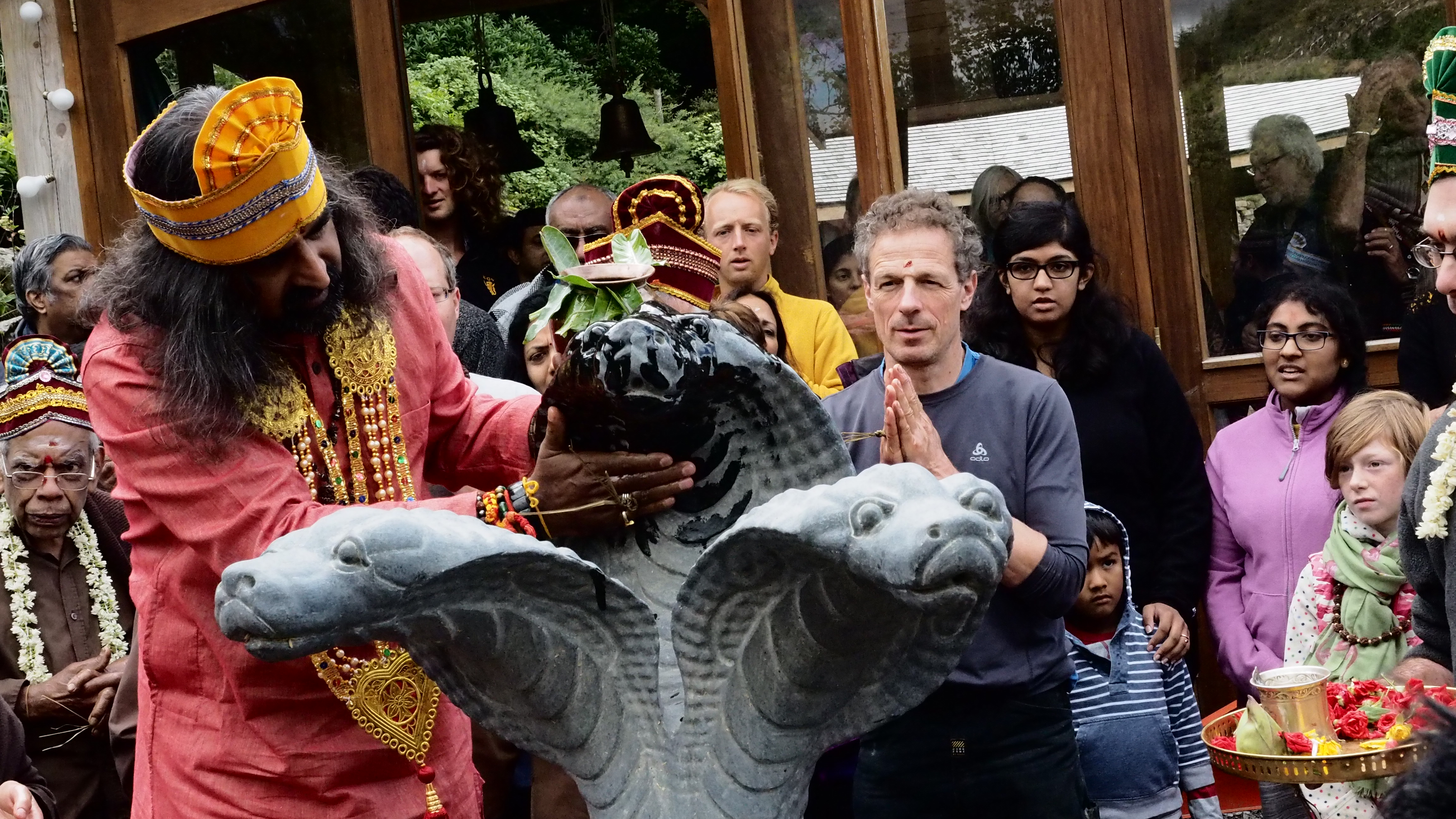
Q: The thing is that, what you’re saying, I agree with you about our house, but what I’m saying is that, is it possible to bring somebody to your own wish?
Mohanji: Why?
Speaker: I am asking.
Mohanji: We should not try. In fact, nope, I would like to see everybody as powerful as themselves, not as me. Because all the all the expressions you see here are independent creations, original, authentic, why should I expect anybody to be like me? I have all the weaknesses and strengths of everybody and they all have the same, I would like them to actualize into something higher, not become me. We shouldn’t even think that. That is what Hitler thought, “I make men in my own image or I destroy them.” That’s a “beautiful” theory.
Speaker: Most of the people want to be like you.
Mohanji: No, that’s ideological thinking. Somebody wrote to me, “I look at you as a perfect human being,” I said, you’re completely mistaken.
(Laughter)
I said, I have all the weaknesses and all the strengths of everybody. Because when you become not a one, one unit, you are everything, so you contain everything. What I mean to say is that we don’t have to have boundaries. First of all, we are not like that. We are not supposed to be in cages. Main cage is our own mind. Right? Our actualization is our birth right and you are actualized by birth. Only this mind factor, which is analysing and trying to assimilate, is delaying the process. Instead be natural, “I am fine.” And from this acceptance you have to grow to the highest level. That’s why true Masters create other Masters, the different Masters, not more followers. When you have more followers, it’s your burden. But if there are more Masters, it’s beauty in the world. True Masters should guide others to become completely fully expanded and fully like bright suns. So they’ll be brightness in the world, I believe this is the right path.
Q: So on how would you say one’s mother who has got attachment to the son, to relieve how you can separate and advise the mother not to have that attachment, so the son can progress further? How you can explain that?
Mohanji: You know, there are two things one is attachment, the other is ownership. Now you’re talking about ownership. As for attachment, look at every being, a bird or an animal or every being, every mother will have an attachment to the child. This is the way of nature, nature created that. Because this is part of nurturing. Now ownership is ignorance, ownership is part of it, “This child, I own this child.” Nobody owns anybody. So what happens? Through awareness, it doesn’t happen. Because after a while it should happen that the child grows up and then it’s on its own feet and things like that. And then if the child has to still support the parents, there should be freedom. The freedom should be there. If there’s no freedom, there’s no support. That’s why if the ownership becomes too much, ownership, possessiveness, control, binding, etc. happens, they’re put into old age homes. That’s why we have so many old age homes, because they don’t know what to do with parents. So they say, “I am busy, mother, I will come and see you when I have time.” The system is created in that way, because the whole education system has given insecurity to the world. Has the education system given freedom? It is not even teaching freedom. A true teaching is that a child is independent, individual, original, authentic that’s it, but we don’t allow the child to be like that. When I was in school, the teacher said I was retarded. Because the question, “What do you want to do when you grow up?” I answered, “I would like to be alone.” And teacher said, “This boy can’t come to study.” No, everybody wants to be an engineer, a doctor, a pilot, all sorts of things, I didn’t want to be anything. So this is the criteria, the benchmark. Well, that’s all very complicated to talk about because the whole system is moving in that direction. Yeah, but don’t confuse between ownership and attachment. See a child should be connected to mother, mother should be connected to a child that’s natural. But when you have ownership and possessiveness, it is unnatural. These two are different things. That leads to problems.
Mohanji: We have the Pooja, so shall we wind up?
Group: Thank you very much.

Transcribed by Kishore Mundanat
Proofread by Arvind Ananthan

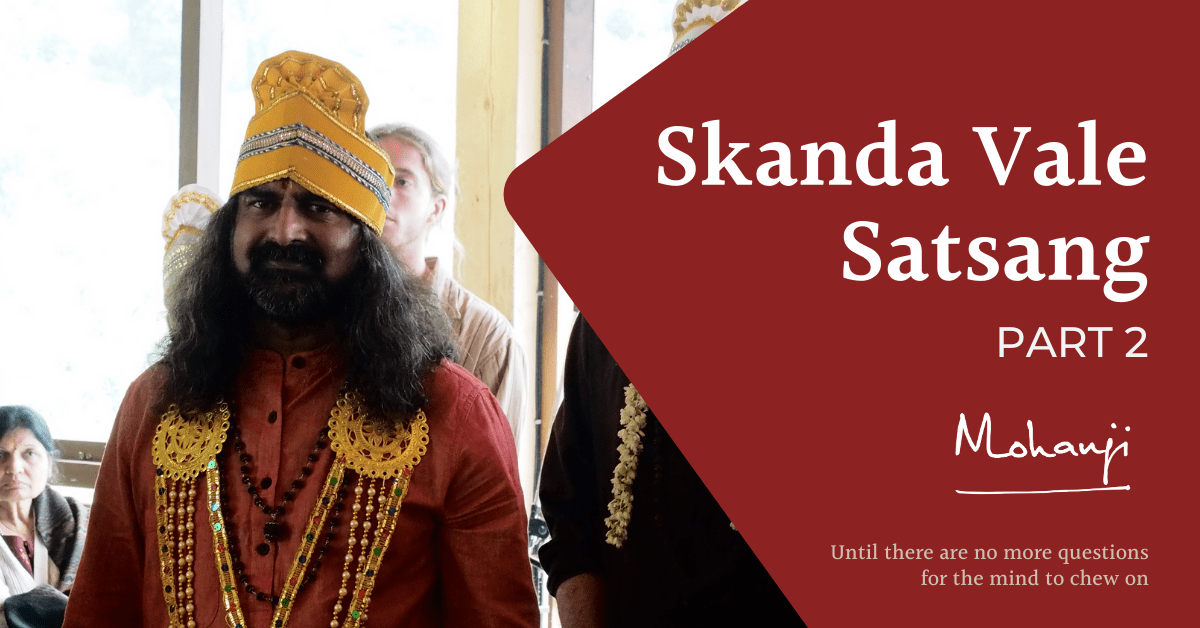
1 thought on “Skanda Vale Satsang – Part 2”
Pingback: Kailash not too far! – Experiences With Mohanji